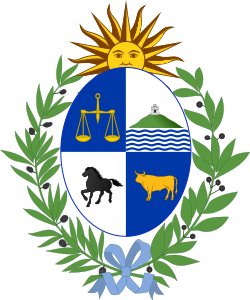 |
|---|
Elections were held in Uruguay on 8 February 1925 for the National Council of Administration and 6 of the 19 members of the Senate. [1] [2] The result was a victory for the National Party, which won 49.3% of the vote. [3]
 |
|---|
Elections were held in Uruguay on 8 February 1925 for the National Council of Administration and 6 of the 19 members of the Senate. [1] [2] The result was a victory for the National Party, which won 49.3% of the vote. [3]
| Party and lema | Votes | % | Seats | |||
|---|---|---|---|---|---|---|
| National Party | 119,255 | 49.30 | 2 | |||
| Colorado Party | Contra el servicio militar obligatorio | 95,486 | 39.47 | 1 | ||
| Colorados riveristas | 16,133 | 6.67 | – | |||
| Por la pureza del sufragio | 2,818 | 1.16 | – | |||
| Unión colorada de Durazno | 1,038 | 0.43 | – | |||
| Colorado Party | 43 | 0.02 | – | |||
| Total | 115,518 | 47.75 | 1 | |||
| Radical Colorado Party | 7,137 | 2.95 | – | |||
| Total | 241,910 | 100.00 | 3 | |||
| Registered voters/turnout | 304,005 | – | ||||
| Source: [2] | ||||||
| Party | Votes | % | Seats | |
|---|---|---|---|---|
| National Party | 20,744 | 53.76 | 5 | |
| Colorado Party | 15,815 | 40.99 | 1 | |
| Radical Colorado Party | 2,025 | 5.25 | – | |
| Total | 38,584 | 100.00 | 6 | |
| Source: [2] | ||||